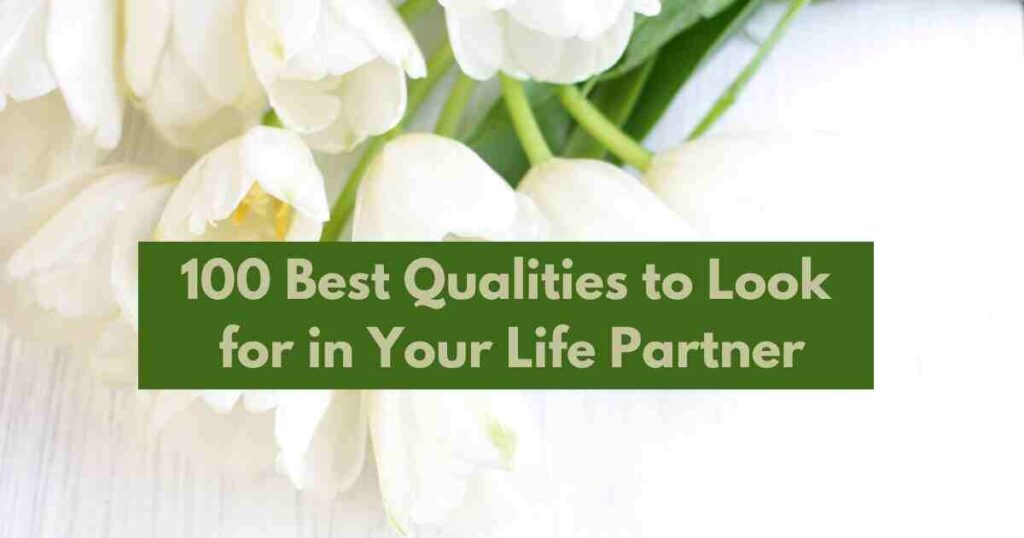
Choosing a life partner is one of the most significant decisions one make in their lives. A relationship built on love, trust, and mutual respect can bring years of happiness, but it requires finding someone whose values, goals, and qualities align with yours. While no one is perfect, there are certain qualities that can indicate a strong, healthy, and lasting partnership. Here are 100 of the best qualities to look for in your life partner, broken down into key categories that are important for building a strong, supportive healthy relationship.
1. Emotional Qualities
Emotional maturity and intelligence are essential in a life partner. These qualities help individuals navigate the ups and downs of life and relationships with grace.
Emotional intelligence – The ability to understand and manage their own emotions and empathize with yours.
Empathy – Willingness to listen, understand, and share in your feelings.
Kindness – Treats you and others with compassion and generosity.
Supportiveness – Stands by your side through challenges and triumphs.
Loyalty – Remains faithful and dedicated to the relationship.
Patience – Able to handle life’s stresses without frustration.
Forgiveness – Can let go of past conflicts and move forward positively.
Humility – Acknowledges their own flaws and seeks personal growth.
Gratitude – Appreciates both the small and significant aspects of life and relationships.
Confidence – Secure in themselves without arrogance.
LOVE RECIPES WITH ROMANTIC FLAVORS
COOK THESE DELICIOUS RECIPES WITH YOUR PARTNER AND ENJOY TOGETHER.
2. Interpersonal Qualities
Communication and respect are at the core of any strong relationship. A partner who excels in these areas will foster a deeper connection and ensure the relationship grows stronger over time.
Good communication skills – Clearly expresses thoughts and listens well.
Honesty – Transparent in actions and words, fostering trust.
Respectful – Treats you, others, and your relationship with dignity.
Generosity – Freely gives time, affection, and resources.
Sense of humor – Brings lightheartedness and joy to the relationship.
Open-mindedness – Embraces new ideas and perspectives.
Compassion – Shows concern for your well-being and the well-being of others.
Trustworthiness – Someone you can depend on and trust fully.
Maturity – Handles emotions and conflicts responsibly.
Fairness – Treats you as an equal, sharing responsibilities and decision-making.
3. Intellectual Qualities
While physical attraction and chemistry are important, intellectual compatibility forms the foundation for stimulating conversations and mutual growth in a relationship.
Intelligence – Engages in thoughtful conversation and has a desire for learning.
Curiosity – Always interested in exploring new ideas and perspectives.
Self-awareness – Understands their strengths, weaknesses, and impact on others.
Problem-solving skills – Approaches challenges logically and calmly.
Ambition – Strives for personal and professional goals that align with your values.
Wisdom – Uses life experiences to make sound decisions and judgments.
Self-discipline – Has control over habits and behaviors, leading a balanced life.
Growth-oriented – Constantly seeks personal development and relationship growth.
Creativity – Brings new ideas and perspectives, making life more exciting.
Visionary thinking – Able to plan for the future with a clear vision of goals and desires.
4. Practical Qualities
In day-to-day life, practical qualities like dependability, financial responsibility, and adaptability play a significant role in maintaining harmony in a relationship.
Financial responsibility – Manages finances wisely and plans for the future.
Hardworking – Dedicated to achieving personal and shared goals.
Dependability – Follows through on promises and commitments.
Adaptability – Willing to adjust to life’s inevitable changes and challenges.
Time management – Values time and uses it effectively for both work and play.
Organizational skills – Keeps life and responsibilities in order.
Problem resolution – Approaches disagreements with the goal of finding solutions.
Work-life balance – Values a healthy balance between career, relaxation, and personal time.
Persistence – Stays determined and committed even in tough times.
Resourcefulness – Able to make the best of what’s available and create opportunities.
5. Lifestyle and Values
Shared values and lifestyle choices are crucial for a harmonious and long-lasting partnership. These qualities ensure that both partners are working toward similar life goals and values.
Shared values – Aligns with you on fundamental beliefs (family, religion, ethics, etc.).
Health-conscious – Values and practices physical and mental well-being.
Similar life goals – Agrees on long-term goals such as family, career, and lifestyle choices.
Passionate – Enthusiastic about their pursuits and your relationship.
Self-care – Takes care of their own mental, emotional, and physical health.
Independence – Can function well alone, and respects your independence.
Respect for boundaries – Understands and honors personal space and boundaries.
Compatibility – Enjoys similar interests and hobbies that enhance your connection.
Environmental awareness – Cares about the planet and practices sustainability.
Balanced lifestyle – Maintains a healthy balance between work, play, and relationships.
6. Family and Social Qualities
How a person interacts with family, friends, and the broader community can tell you a lot about their values and their capacity for building strong, lasting relationships.
Family-oriented – Values family relationships and enjoys being involved with loved ones.
Good with children – If you plan to have children, this is a significant quality.
Respect for elders – Treats older generations with respect and care.
Social compatibility – Fits in well with your social circle and gets along with your friends and family.
Conflict resolution in family – Handles family disagreements with understanding and calmness.
Sense of community – Invests in relationships beyond the immediate family.
Generational respect – Values both younger and older generations.
Team player – Understands that marriage is a partnership that requires teamwork.
Shared responsibilities – Willing to share household and parenting duties.
Respect for your family – Appreciates and respects your family dynamics and traditions.
7. Romantic and Intimacy Qualities
Romantic compatibility and a strong sense of physical and emotional intimacy are key components in creating a fulfilling and lasting relationship.
Affectionate – Comfortable expressing love and warmth.
Passionate about the relationship – Committed to keeping the spark alive.
Physical compatibility – Aligns in terms of physical attraction and intimacy.
Romantic – Enjoys creating and experiencing special moments in your relationship.
Expresses love – Shows affection in ways that resonate with your love language.
Makes you feel valued – Prioritizes making you feel loved and appreciated.
Loyalty in romance – Stays emotionally and physically committed.
Playfulness – Keeps the relationship fun and spontaneous.
Intimacy – Values emotional and physical closeness.
Respect for boundaries in intimacy – Understands and respects your comfort levels.
8. Conflict and Stress Management
Conflict is inevitable in any relationship, but how a person handles disagreements and stress can make all the difference in the quality of your partnership.
Conflict resolution – Approaches disagreements with calmness and maturity.
Stays calm under pressure – Manages stress without becoming overwhelmed.
Diplomatic – Skilled at negotiating and finding compromises.
Forgiving nature – Doesn’t hold grudges and can move past conflicts.
Avoids drama – Doesn’t create or seek out unnecessary conflict or stress.
Level-headed – Remains rational during challenging situations.
Respect during disagreements – Can argue or disagree without resorting to insults or anger.
Not controlling – Respects your autonomy and doesn’t try to manipulate or dominate.
Resilience – Able to bounce back from setbacks, both personally and in the relationship.
Stress management skills – Has healthy coping mechanisms for stress.
9. Spiritual and Philosophical Qualities
Shared beliefs or respect for each other’s spirituality can enhance your emotional and intellectual connection.
Spiritual compatibility – Shares or respects your spiritual beliefs.
Philosophical compatibility – Aligns with your worldview and beliefs.
Moral integrity – Acts in accordance with strong moral principles.
Open to growth – Seeks personal and spiritual growth.
Mindfulness – Practices awareness and presence in daily life.
Purpose-driven – Lives life with a sense of meaning and purpose.
Humility – Humble in their accomplishments and open to learning from others.
Self-reflective – Regularly reflects on their actions, beliefs, and personal growth.
Ethical – Lives life in a way that aligns with their values and ethics.
Respect for diverse beliefs – Honors and respects other belief systems.
10. Personal Characteristics and Traits
Finally, there are some personal traits that contribute to making someone a good partner, ranging from their sense of responsibility to their zest for life.
Responsibility – Takes responsibility for their actions and decisions.
Ambition – Has clear goals and works toward achieving them.
Optimism – Looks at life with a positive, hopeful outlook.
Courage – Faces challenges and fears with bravery.
Integrity – Lives in alignment with their moral and ethical values.
Perseverance – Sticks with commitments, even when the going gets tough.
Authenticity – True to themselves and genuine in their interactions with others.
Sense of adventure – Enjoys new experiences and challenges.
Self-confidence – Comfortable with who they are without arrogance.
Zest for life – Lives life with enthusiasm and joy, making every moment special.
Conclusion
While it’s impossible to find someone who embodies all of these qualities perfectly, a partner who exhibits a significant number of these traits is likely to build a fulfilling, supportive, and long-lasting relationship with you. Each individual brings their unique strengths and weaknesses to a relationship, and the key is to find someone whose qualities complement your own, helping you both grow as individuals and as partners.
RELATED ARTICLES








